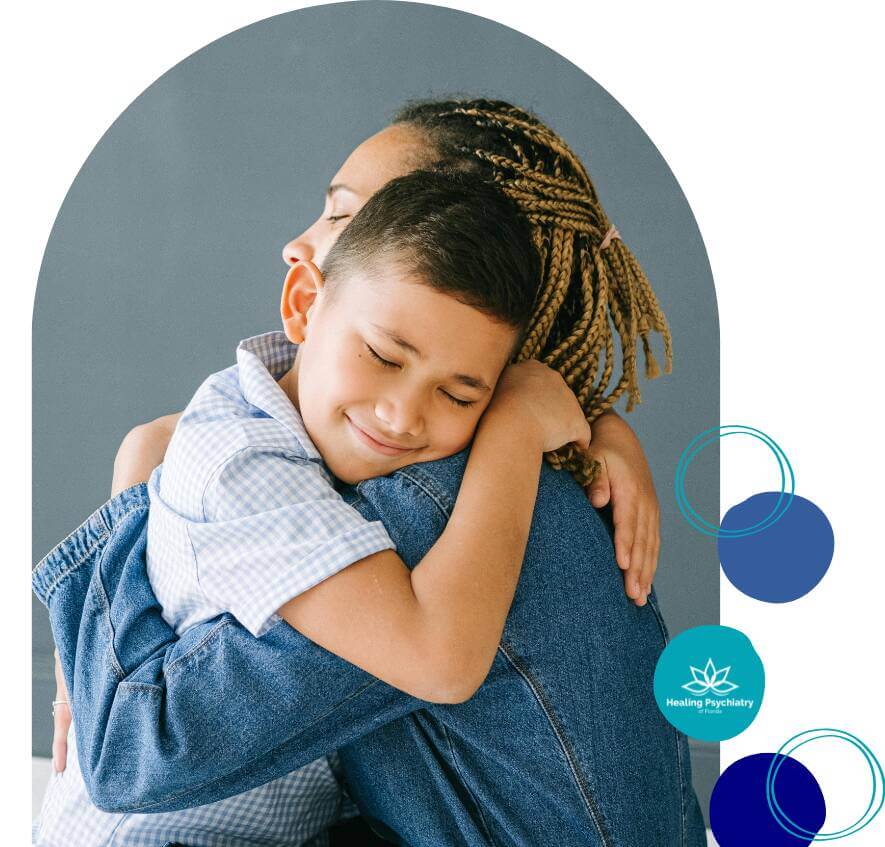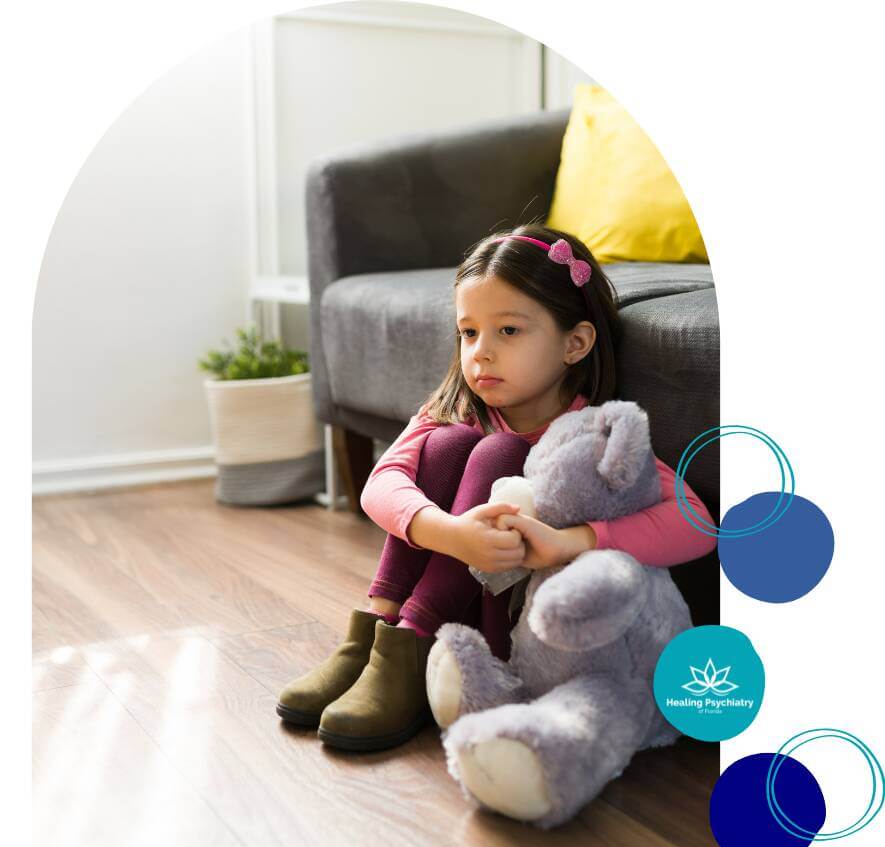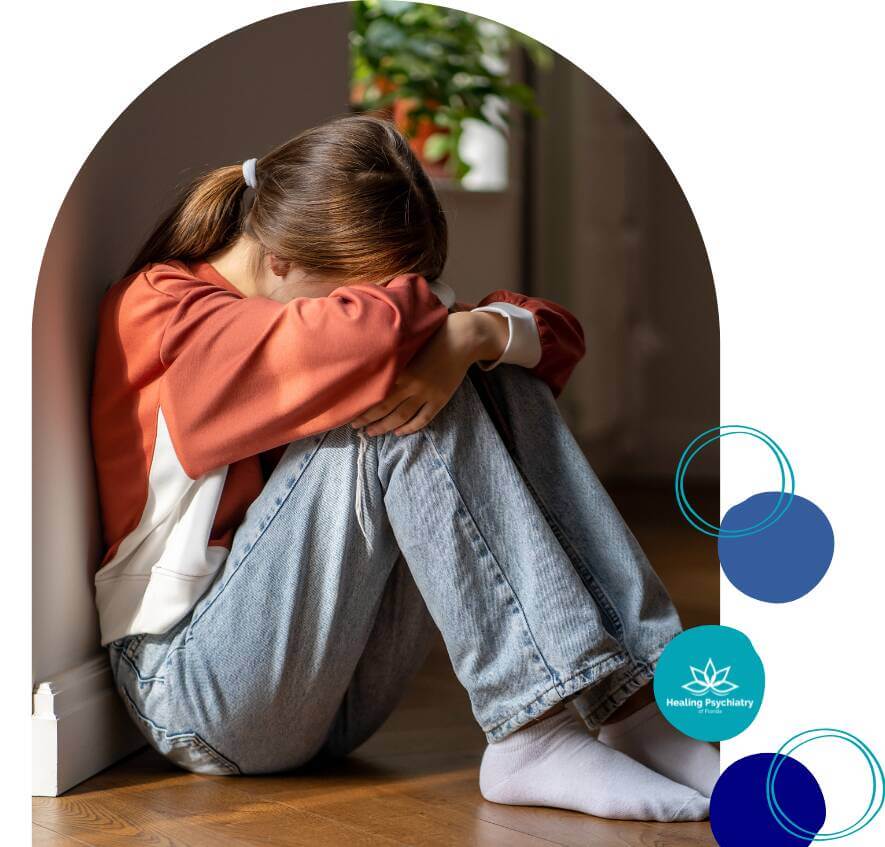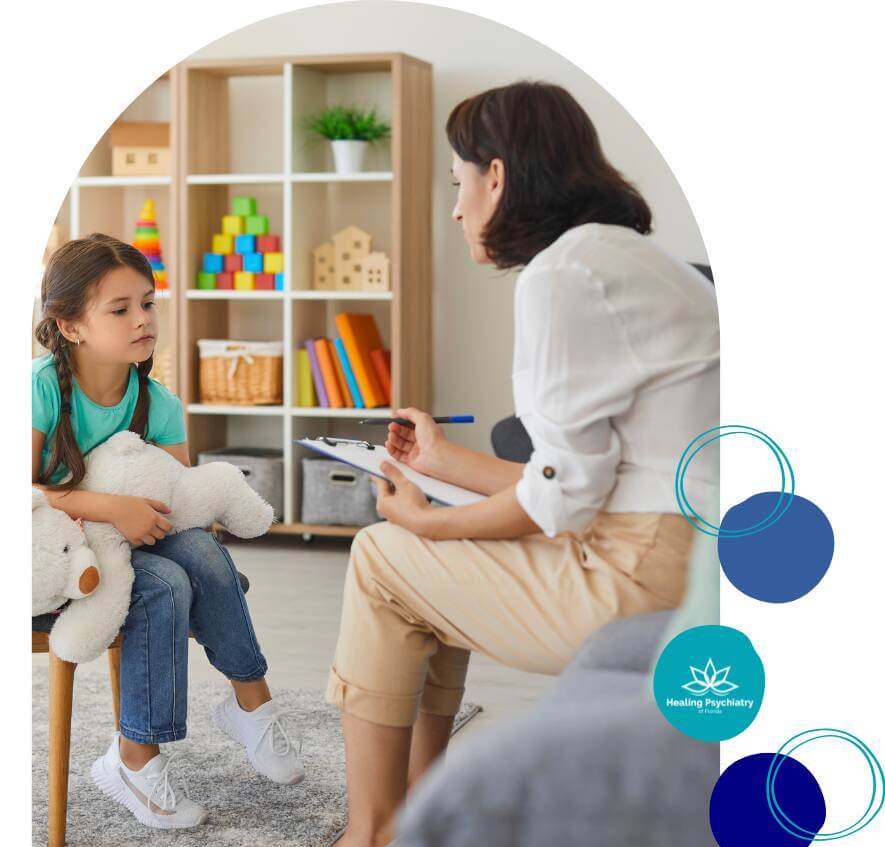Children’s Therapy for Depression
Depression in children can look different—some withdraw, others act out. If changes in sleep, energy, appetite, or motivation persist, it may be time to seek help.
At Healing Psychiatry of Florida, we offer therapy for children’s depression, tailored to their developmental needs. Whether mild depression or major depressive disorder, we create personalized treatment plans using cognitive behavioral therapy, interpersonal therapy, or family therapy. For severe cases, our psychiatry team may consider additional treatments like SSRIs.
Our focus is to provide effective depression treatment for your child and family. If you notice changes in your child’s mood or behavior, it’s time to act.

Start Your Session Today
What Depression Looks Like in Children
Depression in children rarely looks like sadness alone. It shows up as irritability, withdrawal, anger, or changes in sleep, appetite, or energy. Many parents don’t realize what they’re seeing is depression—especially when symptoms look more like behavior problems or fatigue. The causes are rarely simple, and the signs are easy to miss. What matters most is paying attention to the patterns that disrupt a child’s life, relationships, or overall mood. Here’s what usually contributes.
Disconnection at Home—Even in Caring Families
Young children depend on emotional closeness to feel safe. When a home environment becomes tense, inconsistent, or emotionally distant—because of stress, conflict, or even logistical overwhelm—children internalize those signals as personal. Without intending to, parents might miss signs of sadness, withdrawal, or irritability. These aren’t signs of defiance—they’re often early signs of childhood depression or emotional overload.
Life Events That Outpace Coping
Children are constantly trying to make sense of their world, and when big things happen—moving, divorce, illness in the family, death of a grandparent—they may not have the words to process it. That doesn’t mean it’s not affecting them. Changes in sleep patterns, appetite, behavior, or energy are often how younger children show distress. Left una
When Physical Symptoms Show Up First
Unlike adults, children often show emotional pain through physical complaints. Headaches, trouble sleeping, stomach aches, or sudden fatigue may be early signs of major depression, not just physical issues. Children may not say they feel sad—but their bodies often speak first.
See what others are saying about Healing Psychiatry of Florida
Meet Our Depression Therapy Psychiatrists
Our team works with children facing emotional struggles like sadness, irritability, or isolation. We understand that kids may not open up right away, so we use developmentally appropriate methods—like conversation, play, and creative expression—to help them feel understood.
We also collaborate with parents, teachers, and healthcare providers to ensure progress continues beyond sessions. Whether your child has mild symptoms or more severe depression, our goal is to create lasting change in their daily life.



For Kids Who Shut Down, Withdraw, or Seem “Flat”
Some children stop engaging. They lose interest in play, pull away from friends, or seem emotionally muted. Parents often describe it as “the light going out.” For these children, cognitive behavioral therapy is often the best starting point. It helps them reconnect thoughts, feelings, and behavior—and begin to shift out of the mental loops that keep them stuck.


For Kids Struggling with Connection, Conflict, or Emotional Closeness
When depression is tied to problematic relationships or emotional tension at home, therapy needs to focus on communication and connection. We use interpersonal psychotherapy and family therapy to help children name what they feel, strengthen bonds, and build healthier patterns inside their closest relationships.
For Kids Overwhelmed by Intensity or Big Mood Swings
Depression often clouds your outlook on life, making everything seem bleak or hopeless.
Some children don’t just feel down—they spiral. Their moods swing fast. They’re quick to anger, easily frustrated, or constantly overwhelmed. In these cases, we may use parts of dialectical behavior therapy, an approach that teaches emotional regulation, distress tolerance, and coping strategies that actually work in the moment.

Children’s Therapy for Depression
FAQs
How do I know if my child’s depression is clinical or just a passing phase?
Children go through emotional ups and downs, but when a low mood affects their sleep, behavior, relationships, or motivation for more than one to two weeks, it may point to clinical depression. A full evaluation helps clarify the severity, whether it’s mild or part of a depressive disorder, and what level of care is appropriate.
Do you treat depression alongside other psychiatric disorders like anxiety or bipolar disorder?
Yes. Many children with depression also show signs of bipolar disorder, anxiety, or other psychiatric disorders. Our team is trained to recognize overlapping symptoms and design a treatment plan that addresses multiple layers—not just a single diagnosis.
What if my child has already tried talk therapy and it didn’t help?
Not all therapies are the same. We use evidence based psychosocial treatments, including options beyond talk therapy, such as structured CBT, interpersonal therapy, and parent-child models. If previous care didn’t create meaningful progress, we reevaluate the approach—not the child.
When are medications or SSRIs considered?
Antidepressant medication, including fluoxetine treatment, may be considered if symptoms are severe, persistent, or unresponsive to therapy alone. Our team follows guidelines from the American Psychiatric Association and the National Institute of Mental Health. If medication is appropriate, we monitor progress closely and coordinate with your healthcare provider.
Do you work with younger children, or only older kids?
We treat children of all ages, from younger kids to school-age kids. While depression in children can look different from how it shows up in teens, early support can prevent long-term effects. Therapy is adapted to the child’s age, communication style, and developmental stage.
How involved will I be in my child’s treatment?
We believe in involving parents from the very beginning. You’ll receive regular updates, clear strategies for home, and guidance to help reinforce progress outside of sessions. We also work with other caregivers and schools when needed to ensure consistent support across your child’s environment.
Contact us
For more information about our systems and services, contact Healing Psychiatry of Florida.
Healing Psychiatry of Florida
Altamonte Springs
Lake Baldwin
Altamonte Springs
108 W Citrus St.
Altamonte Springs, FL 32714
Monday – Thursday: 8:00 AM – 6:00 PM
Friday: 8:00 AM – 5:00 PM
Saturday & Sunday: Closed
Lake Baldwin
3203 Lawton Rd. Suite 140
Orlando, FL 32803
Monday – Thursday: 8:00 AM – 6:00 PM
Friday: 8:00 AM – 5:00 PM
Saturday & Sunday: Closed
